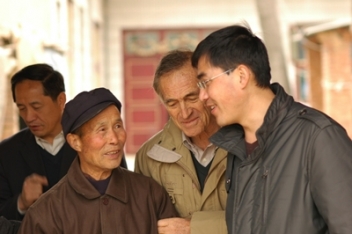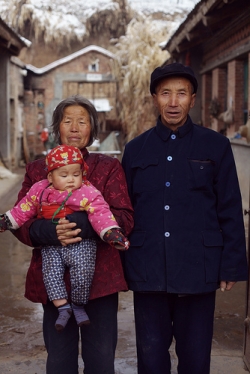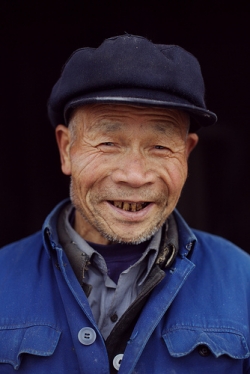 By Eduardo Klien, Regional Representative for East Asia and Pacific:
By Eduardo Klien, Regional Representative for East Asia and Pacific:
China never ceases to amaze me. The China I first visited in 1998 is very different from the one we see nowadays. This is one of the most radical and rapid social change in history.
Past and present converge
The transformation is overwhelming. It is evident in the modernisation of cities, means of communication, dress codes, attitudes of the youth and the expansion of media.
It is modernisation at top gear, but at the same time is the maintenance of old and not so old traditions. China’s history is present everywhere.
In Sichuan, for example, one can see the Dujiangyan irrigation and flood-control system that dates back more than 2,300 years… and is still working! China is a nation proud of its history and traditions; it is risking a lot by embracing modernity at such speed.
I took part in the Project Advisory Committee Annual Review for the project in Shaanxi and the launch of the new project in Sichuan. While Peter, Deng Xueyi (Bob) and Jongjit carried out interviews and financial training.
 Will and capacity to help older people
Will and capacity to help older people
I visited Sichuan University, where Prof. Yuan, an old friend of HelpAge, introduced me to the Dean of Public Health, allowing me to discuss the Health Working Group (HWG) self-care approach. It is clear that the University of Sichuan could contribute to the HWG initiative at anytime. They have the will and the capacity.
We are active in China through several projects in different locations. We work with CNCA (China National Committee on Ageing), based in Beijing, in a one-million dollar project with UNFPA. This promotes local planning for ageing in six counties in different provinces in east, central and western regions of China.
The second project is based in Shaanxi province (capital Xi’an) and promotes the development of Older People’s Associations. This project is funded by the EC and the Kadoorie Charitable Foundation.
The third project supports the rehabilitation after the Sichuan earthquake of May 2008 and is funded by an anonymous donor. OPAs are functional to this project too.
We have staff in the three locations. Deng Xueyi in Xi’an, has wide experience in OPA development, having worked with us for six years. Cao Kai, sociologist, in Beijing, is instrumental in our project with CNCA and UNFPA. Other Chinese staff are committed, young and professionally interested in ageing. In addition, SAG (Sponsor a Grandparent) supports community based projects in Sichuan and Hunan provinces.
 Challenge is to adapt to surroundings
Challenge is to adapt to surroundings
China is perhaps the most decentralized country in Asia. It cannot be any other way. Sichuan province, for example, has over 80 million inhabitants, 15 million of them older people. The provincial government is fully empowered to plan and promote its own development, raise taxes, lure investment, manage its education systems (within general parameters) and implement policies on ageing.
The challenge to us is how to support policy development in these contexts. We have learned that the bottom-up and middle-up approaches are an effective way and that national approaches frequently require previous consensus at provincial levels.
HelpAge has a distinctive competence acquired in China, related to the OPA development and its use in promoting not only well-being for older people but also enhancing rural development in underdeveloped areas.
This is coherent with the Communist party policies of reducing the gap between urban and rural areas, between west and east regions and between rich and poor.
It is also coherent with the stated goal of promoting harmonious development. The OPAs have successfully dealt with promoting livelihoods and health (according to an EC evaluation and the government’s views, among others).
The question for us now is how to scale up to other counties and new provinces. New projects will have to deal with that. HelpAge has also been disseminating options for social pensions through trainings, research, workshop and relevant documents. But it is fair to say that we have limited resources to advocate in this area.
How to survive a trip to China: Pace yourself!
If you are going to do official travel in China you have to be prepared. The Chinese (as many other people in the world) like to express their appreciation for you through the food. The difference is that, wherever you go, a poor village or a fancy restaurant, the partners and government officials will offer you the most exquisite plates you can imagine.
One mistake commonly made is to eat too much in the first rounds, when you think that the plates on the table are all that there is. Wrong! Food keeps coming and coming, each dish more delicious than the previous one.
In those “appreciation” events, you also have to be prepared for the “Gambei”. This is a sort of battle cry to make you drink. Small cups of rice alcohol are continuously filled and refilled. And everyone toasts with everyone else.
It is impolite not to correspond. Gambei means “bottom up” (“Chen pechen” in Vietnamese, “seco y volteado” in Spanish). You have to empty the cup, once and again.
Peter, our Regional Programme Manager responsible for China, has become a specialist in elusive strategies, like pouring your cup into the soup at the moment of raising your glass, without the hosts noticing it. (note: Peter disputes this.)
Read more about HelpAge’s work in China.
